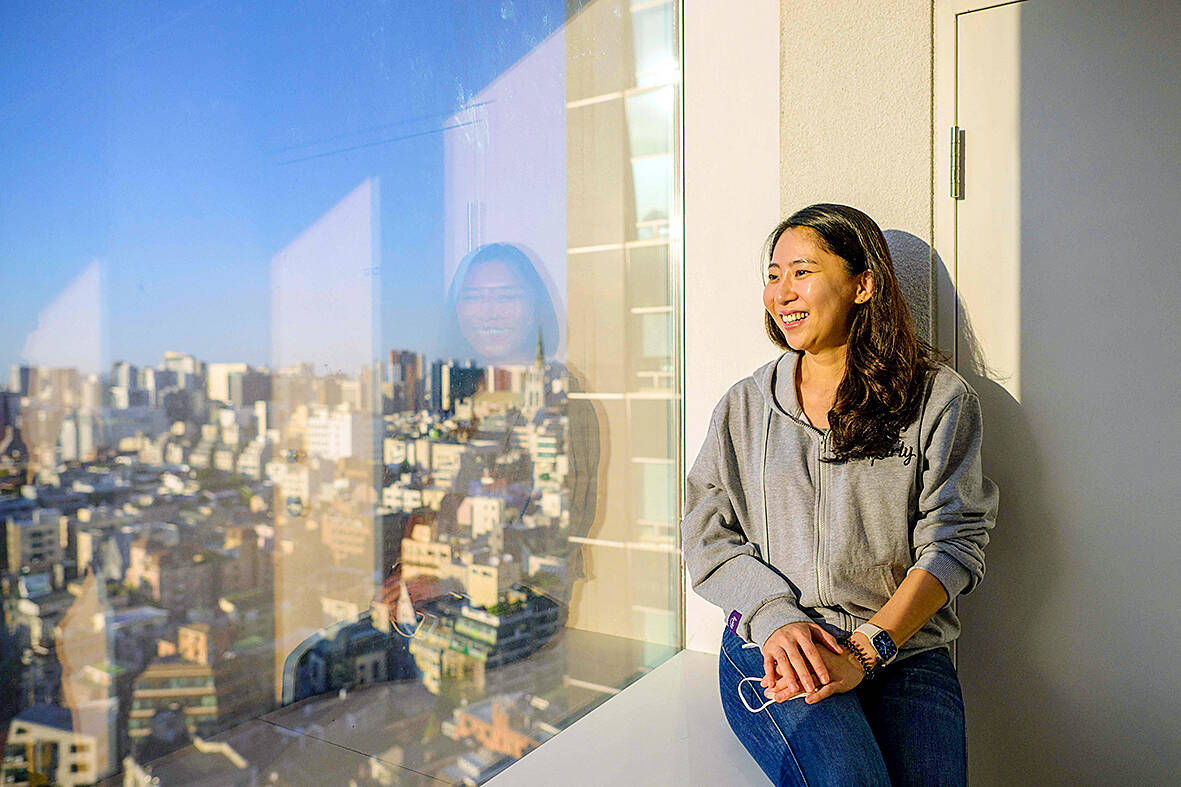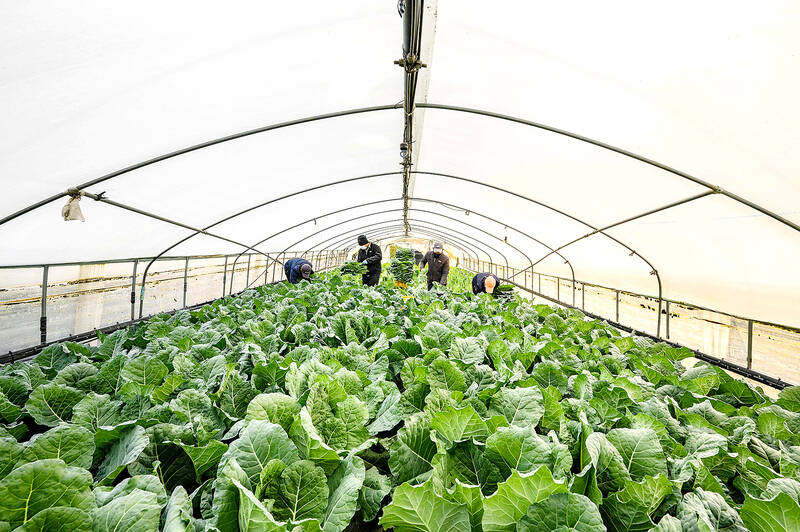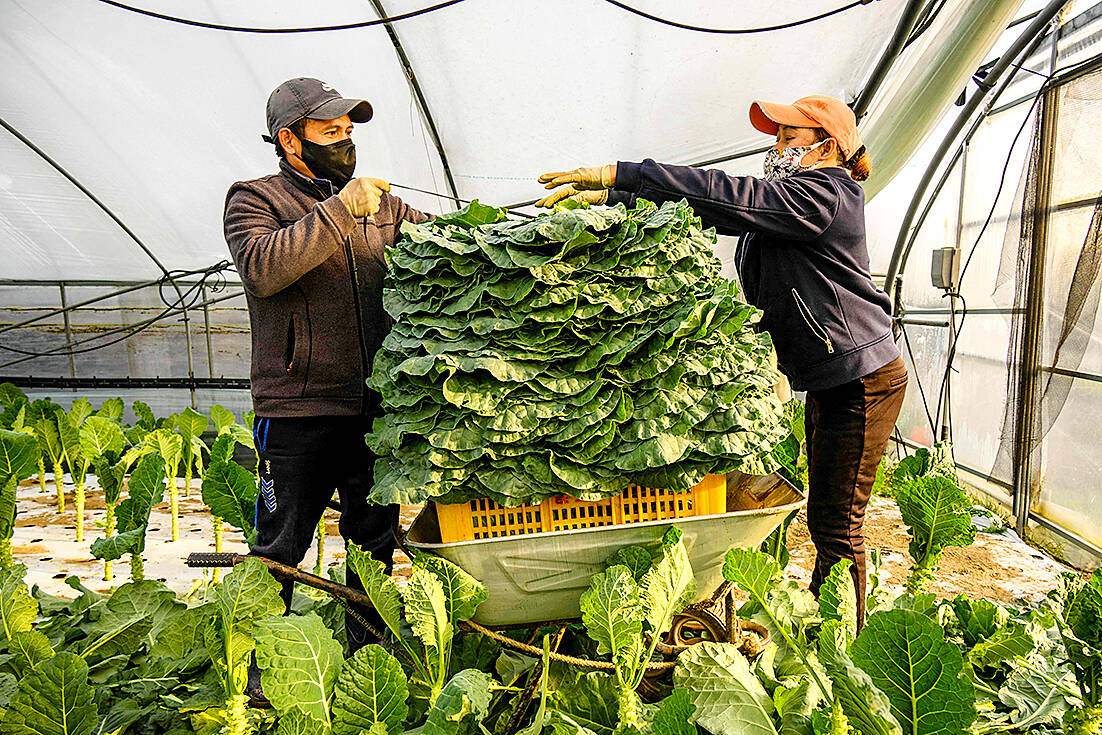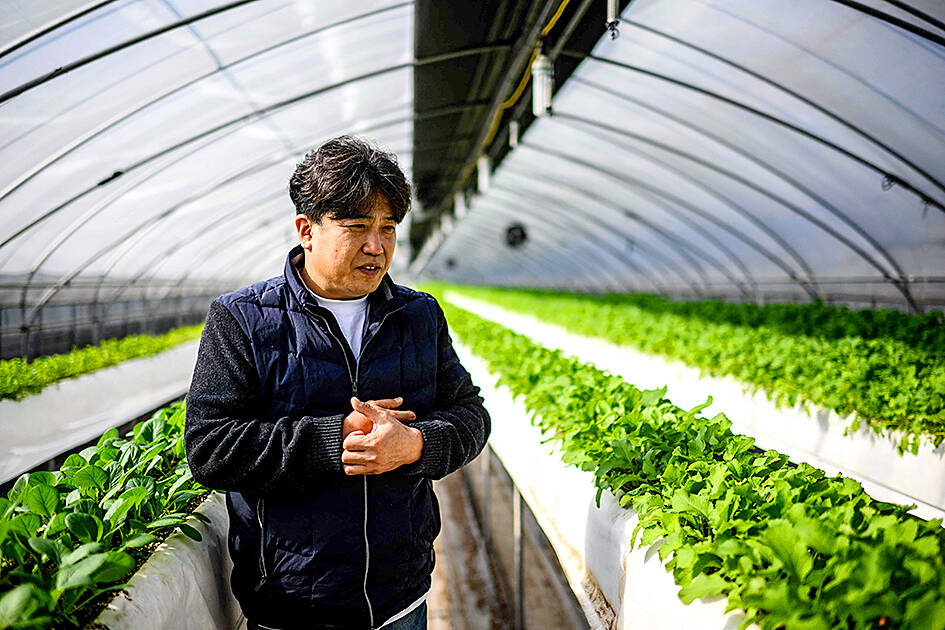When Sophie Kim moved home to South Korea after 15 years in the US, she couldn’t find anywhere to buy kale for her green juice. So she found a farmer, then built an app to help others seek out top-quality produce.
The next-day grocery delivery service Market Kurly that 38-year-old Kim founded is now one of South Korea’s most important startup unicorns, last valued at US$3 billion and set for an initial public offering by February.
Kim, a self-professed “foodie,” came up with the idea after she got tired of endlessly going from shop to shop to find the high-quality groceries she wanted in Seoul’s supermarkets.

Photo: AFP
But she knew the products were out there and began driving to South Korea’s agricultural heartlands to find them, for example visiting the famous meat market in Majang-dong to procure half a cow’s worth of beef, which she would then split with her co-workers.
“While I was trying to figure out why it was so difficult to have access to great quality, fresh food in Korea, I got to know some farmers and fishermen, and they had exactly the same issue of not being able to find customers,” she said.
Korean farmers “are proud of the fact that they can produce such nice quality products, but it is extremely difficult for them to get to the consumer,” she said.

Photo: AFP
At first, Kim said she thought about setting up a farmers market, before abandoning the idea as too unwieldy and — more importantly — unhelpful for producers, who don’t have the time to travel to Seoul.
LIGHTBULB MOMENT
It was a lightbulb moment when Kim realized “if we can make this work for both consumers and producers, it would probably be a breakthrough for the entire industry.”

Photo: AFP
Kurly customers — initially urban working women but now a diverse cross section of society — can order rare beef, hand-made bread or pick one of more than a dozen varieties of local, hard-to-find apples by 11pm and be guaranteed delivery by 7am the next morning.
As with companies from Amazon to Uber Eats, the rapid-fast shipments rely largely on gig economy drivers, and Kurly has not been immune to the global industry-wide complaints of overwork and poor conditions.
But consumer convenience has proved key to the app’s success — even though Kim says she’s most proud of how the complex data-driven logistics network she’s built supports South Korea’s beleaguered farmers.

Photo: AFP
Kim launched Market Kurly with 30 products, including her beloved kale, which was supplied by farmer Hwang Han-soo, who has been growing organic vegetables for 30 years at his farm in Gyeonggi province.
Hwang said that his kale was originally popular only with cancer patients for its perceived health benefits. He sold so little of it he considered switching crops, but the pleas of one of his terminally-ill customers in Busan convinced him to keep going.
Farming is tough in South Korea, Hwang said, owing to thin profit margins and a reliance on hard-to-find overseas workers amid dwindling interest in the industry from young South Koreans.
But working with Kurly has helped.
“In the early days of Kurly, we sold around 20 to 30 bags each day (but now) our average daily sales is around 800 bags” of kale, he said.
Part of the growth can be attributed to changing consumer trends, with kale now popular with young women who see it as a trendy health food, Hwang said, but Kurly’s next-day cold-chain logistics network also plays a key role.
SOCIAL COST
“It takes less than a day to go from harvesting to the consumer’s doorstep,” he said, adding that before Kurly came along it would take two or three days for his kale to make it to stores.
Next-day delivery services are “very helpful because it is a system that goes directly from the farm to the consumers,” while Kurly also handled all the promotion and marketing, he said.
“I can focus on farming,” he added.
Hwang also said reading reviews of his products on Kurly’s app allowed him to feel more connected to the people who eat what he grows.
South Korea’s next-day delivery apps including Kurly and rival Coupang Fresh have been criticized for the strain they put on delivery drivers, with local media reporting on occasional deaths from extreme overwork, as workers make scores of deliveries each night.
The rise of such services has also sucked gig workers from other crucial sectors including city taxis, where the supply crunch is so severe that the Seoul government recently hiked basic fares in a bid to entice more drivers to provide late-night services.
It is important for South Korea’s unicorns like Market Kurly to take into account the social costs of their business models, said Minister for Small and Medium Enterprises and Start-ups Lee Young.
“It’s very possible for these platform companies to contribute to society,” she said.
“Market Kurly is a very good example because it has created a very innovative idea and they have gone through multiple struggles until they achieved current success.”

Growing up in a rural, religious community in western Canada, Kyle McCarthy loved hockey, but once he came out at 19, he quit, convinced being openly gay and an active player was untenable. So the 32-year-old says he is “very surprised” by the runaway success of Heated Rivalry, a Canadian-made series about the romance between two closeted gay players in a sport that has historically made gay men feel unwelcome. Ben Baby, the 43-year-old commissioner of the Toronto Gay Hockey Association (TGHA), calls the success of the show — which has catapulted its young lead actors to stardom -- “shocking,” and says

Inside an ordinary-looking townhouse on a narrow road in central Kaohsiung, Tsai A-li (蔡阿李) raised her three children alone for 15 years. As far as the children knew, their father was away working in the US. They were kept in the dark for as long as possible by their mother, for the truth was perhaps too sad and unjust for their young minds to bear. The family home of White Terror victim Ko Chi-hua (柯旗化) is now open to the public. Admission is free and it is just a short walk from the Kaohsiung train station. Walk two blocks south along Jhongshan

The 2018 nine-in-one local elections were a wild ride that no one saw coming. Entering that year, the Chinese Nationalist Party (KMT) was demoralized and in disarray — and fearing an existential crisis. By the end of the year, the party was riding high and swept most of the country in a landslide, including toppling the Democratic Progressive Party (DPP) in their Kaohsiung stronghold. Could something like that happen again on the DPP side in this year’s nine-in-one elections? The short answer is not exactly; the conditions were very specific. However, it does illustrate how swiftly every assumption early in an

Snoop Dogg arrived at Intuit Dome hours before tipoff, long before most fans filled the arena and even before some players. Dressed in a gray suit and black turtleneck, a diamond-encrusted Peacock pendant resting on his chest and purple Chuck Taylor sneakers with gold laces nodding to his lifelong Los Angeles Lakers allegiance, Snoop didn’t rush. He didn’t posture. He waited for his moment to shine as an NBA analyst alongside Reggie Miller and Terry Gannon for Peacock’s recent Golden State Warriors at Los Angeles Clippers broadcast during the second half. With an AP reporter trailing him through the arena for an